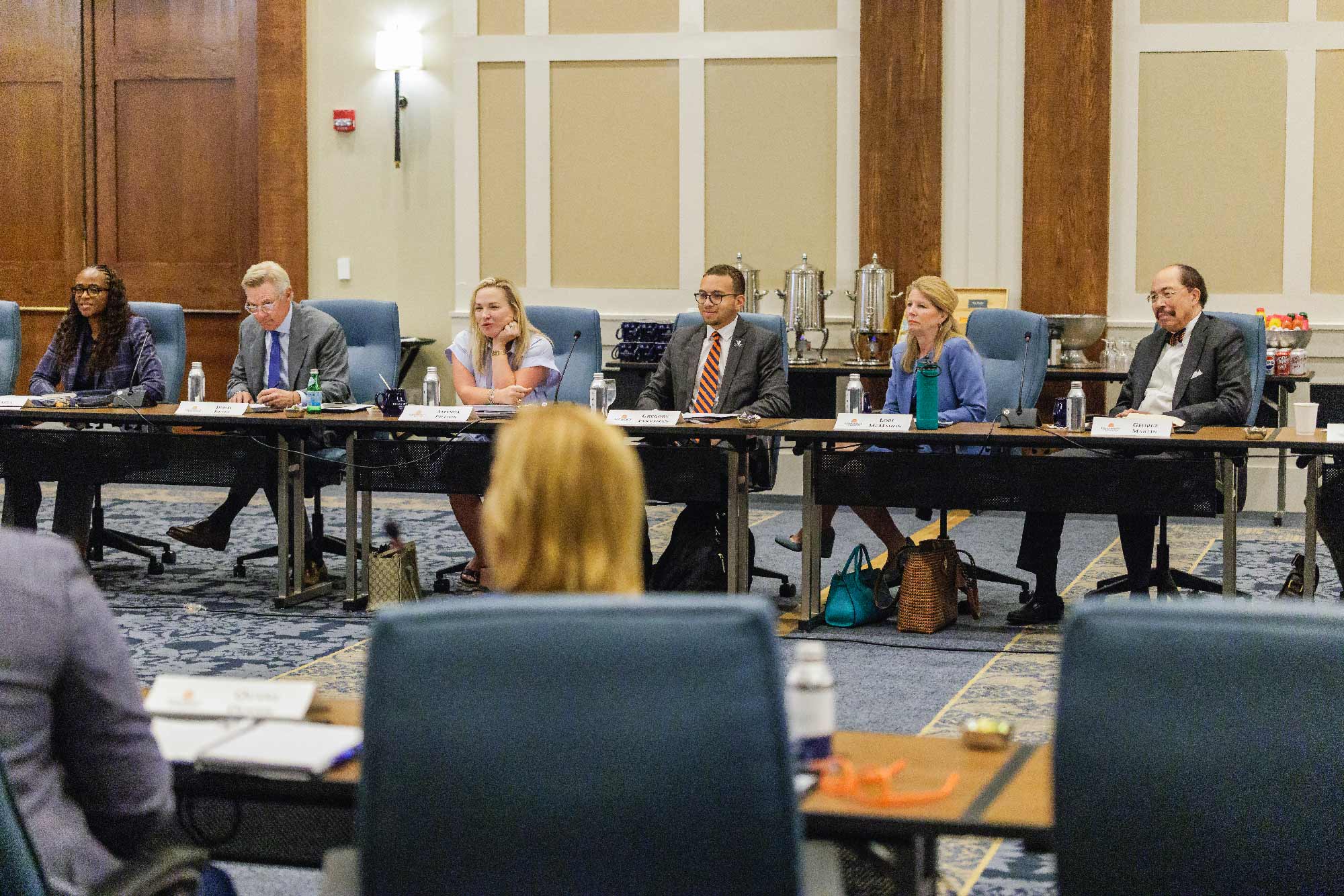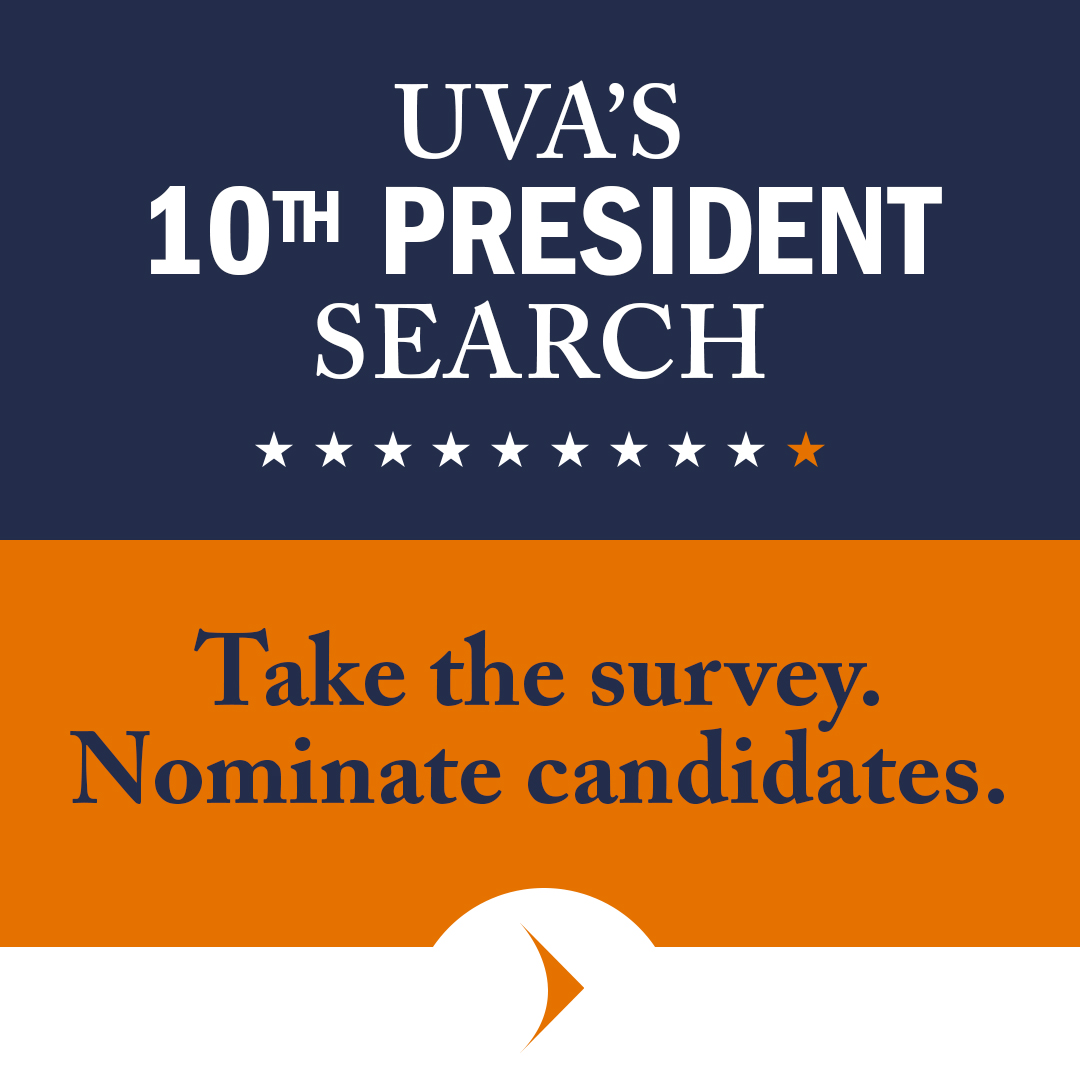The University of Virginia community is seeking a 10th president who will lead with integrity and compassion, trust and transparency, and unite around core UVA values, according to a compilation of feedback from meetings and results of an online survey presented Monday to the Special Committee on the Nomination of a President.
The special committee met to hear from the executive search firm overseeing the recruitment, and the several subcommittees that have reached out to University constituencies on Grounds and beyond.
Representatives of the Isaacson, Miller search firm reported the special committee has received 42 nominations for president through the presidential search website. More than 300 people have responded to the website’s survey.

The special committee, shown here at the group’s first meeting in August, has been seeking input from University community members, both in meetings and through an online survey. (Photo by Lathan Goumas, University Communications)
Staff members responded to the online survey in the greatest numbers, followed by alumni and students, according to Isaacson, Miller representatives. The survey remains open for both comments and nominations.
The top requests from the online survey are for a president who will maintain UVA’s position as a national leader in higher education, recruit and retain high-quality faculty, maintain access and affordability, and enhance academic excellence while bolstering the research enterprise.
In addition to feedback from the website, presidential search subcommittees have held a dozen listening sessions across a spectrum of the UVA community, with more planned later in the month. Those sessions are likewise providing a sketch of the desired qualities for the University’s 10th president.
“We are very pleased as a firm for what these listening sessions have been like,” John Isaacson, the search firm founder, told the special committee. “I’ll just say that they have been more candid, clearer and more insightful than we usually experience. These things have a tendency to be performative at this stage. That’s less true here. People have been substantive and impressive in their work, in the way in which they’ve explained UVA’s position and aspirations for the future. It’s been a real pleasure to listen to all these folks.”
According to the Isaacson, Miller summary of the listening session themes, University community members desire a leader who will:
- Effectively engage faculty, students, alumni, board members and government leaders
- Champion UVA’s role in serving the commonwealth, nation and world
- Make tough decisions and act quickly
- Accept criticism and place UVA’s needs ahead of personal ambition
- Elevate UVA in the minds of state and national leaders
- Focus on being a “good neighbor” to the region
- Be visible on Grounds and connect with students
- Bring joy, charisma and celebration to the role
Isaacson said the responses from the website survey and listening sessions will help create a general profile of a preferred candidate. The profile will outline a series of challenges the next president must face, and the qualification desired for the position.
University Rector Rachel Sheridan noted during the subcommittee reports that, understandably, much of the feedback has come from leadership representing faculty, staff and students.
“Do you get the sense that you’re reaching all student populations?” she asked Dr. Babur Lateef, an ophthalmologist and UVA graduate student who is chairing the student subcommittee. “There are a lot of students here and I want to make sure we’re canvassing everyone for their thoughts.”
Lateef said they are planning additional outreach.
“We’re going to make this extra effort over the next couple of weeks to really try to do that, and to even engage after we close the listening session, to make sure we’re updating folks,” Lateef said. “It’s really important for us to make sure the students do understand that we’re listening to them, and we have listened to them. We want to incorporate their thoughts into what we’re looking for in the candidates.”
George Martin, a former rector leading the faculty subcommittee, said he would like to see more faculty participation in the sessions, and he and his committee are working on a plan increase engagement.
“The consensus is that we should do more outreach, and we can vary the design of that outreach,” Martin said. “It’s very important for more people to feel they are involved in the process.”
The special committee met for an hour in closed session to discuss some of the candidates who have already emerged. Isaacson told the committee he is impressed with the number of high-quality candidates interested in the position, which exceeded his expectations for this early stage of the search.
After the closed session, Vice Rector Porter Wilkinson told the committee the next meetings will be in October and early November to discuss the recruitment process. Consistent with the original timeline of four to six months, the committee doesn’t anticipate any in-person interviews until late November.





